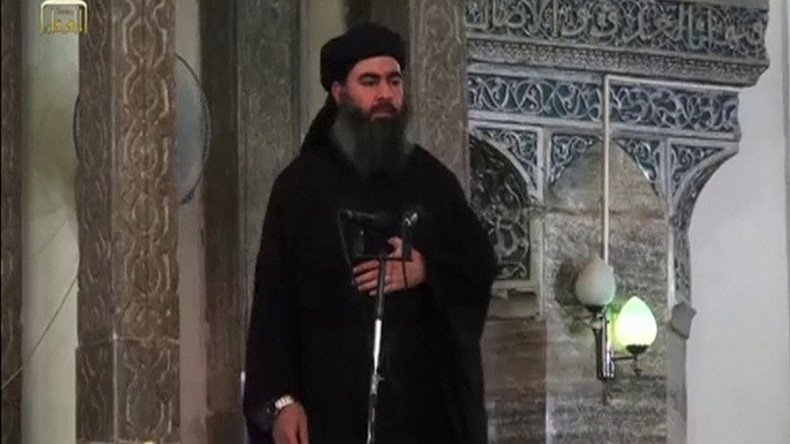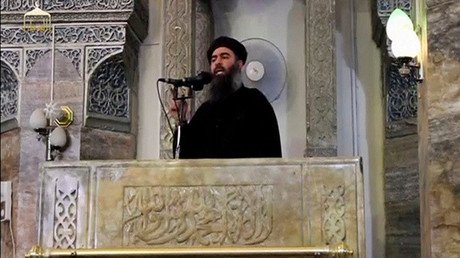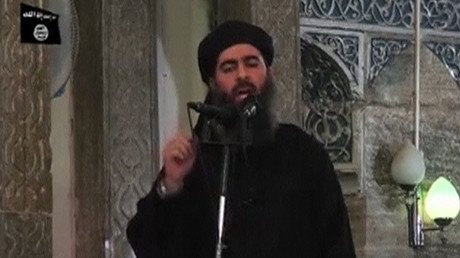Who's your Baghdadi? ‘US sowing global chaos by supporting terrorists and regime change’

If reports are confirmed that Russian airstrikes killed ISIS leader Abu Bakr al-Baghdadi, it won’t matter who his replacement is, says author Nicolas Davies. Professor Jamal Wakeem and military analyst Kamal Alam also join the conversation.
Following reports of ISIS leader Abu Bakr al-Baghdadi's elimination by a Russian air strike, speculation is rife over who would replace him if his death is confirmed.
Many experts consider Iyad al-Obaidi and Ayad al-Jumaili, deposed Iraqi leader Saddam Hussein's former operatives, to be the two main contenders to replace the former terrorist leader.
Unlike Baghdadi, however, who has a strong religious background, both men served as security officials in the secularist Iraq Ba'ath Party. After the US-led invasion of Iraq in 2003 that shattered the Ba'athists, they both joined the Sunni insurgency, part of which later transformed into ISIS.
RT: There's speculation over ISIS leader Abu Bakr al-Baghdadi's replacement if his death from a Russian air strike is confirmed. The two leading contenders are former operatives of Saddam Hussein. What do you think about that? Will the change of command make much of a difference?
Nicolas Davies: In the big picture it’s not really going to make much difference who replaces Baghdadi. Essentially we’re still going to be dealing with an endless proliferation of these jihadi groups: al-Qaeda, ISIS – whatever form it takes, assuming that the US-led forces are able to recapture Mosul and Raqqa, albeit at the expense of tens of thousands of civilian casualties. As we’ve seen the people that the US is fighting are quite capable of striking back in other places, even as this all is going on in this last month, we’ve seen them strike inside the Green Zone in Kabul. We’ve seen them striking in Manchester, England. We’ve seen them strike in London again after that.
Essentially, what the US has done in the last 16 years is to take a small group of jihadists, who were scurrying between safe havens in Sudan and Afghanistan, and blow this up into a global asymmetric war by responding to horrific crimes in New York, Washington and Pennsylvania with a declaration of war. They granted the jihadists the status of belligerents, which was exactly what they wanted instead of simply going after them as criminals. Now we’re facing asymmetric war that has carried on for 16 years. We would be foolish to think that this cannot get much worse. There is a central contradiction in US policy between conducting regime change wars in Iraq, Libya and Syria, in which the US supports terrorists, for want of a better word… The US is simply fueling endless conflict and chaos across the world by supporting both terrorists in many of these countries, and at the same time trying to overthrow governments. These two goals are completely incompatible.
Ruins of Great al-Nuri Mosque captured by drone in devastated Old #Mosul (VIDEO) https://t.co/J9ur54ktWqpic.twitter.com/OqNgkMLRlk
— RT (@RT_com) 24 июня 2017 г.
'Hussein operatives infiltrated ISIS'
Jamal Wakeem, international relations professor.
RT: What do you think of the prospect of Saddam Hussein's former operatives leading ISIS?
Jamal Wakeem: I believe this could be a probability, especially since ISIS was infiltrated by former Saddam Hussein regime elements, especially after the fall of the regime, because the regime of Saddam Hussein relied heavily on the tribes and the Sunnis of western Iraq. So after the fall of the regime there was a reshuffle of the political structure in Iraq to integrate mainly the Shia and the Kurds into the state institutions. The Americans dismantled the army of Hussein and all other institutions that were dominated by the Ba'ath regime.
This coupled with the breaking up the spirit of these people, especially after they were captured and put in prisons and the humiliation they were subjected to – like in the case of Abu Ghraib, for example, in 2003 - made them ripe for being invested in, especially by Saudi Arabia and by radical groups coming from Saudi Arabia. So that’s why they got radicalized; instead of being Ba'athists and secularists, they adopted radical Islamic ideology, mainly affiliated with Wahhabi Islam in Saudi Arabia, and they joined al-Qaeda affiliated groups like ISIS, and other groups. In 2013 when ISIS was able to break out and control many regions – whether in Syria, or in Iraq – it relied heavily on officers from the former Saddam Hussein army in training its soldiers and in leading attacks.
RT: Do you think the US-led coalition could foresee these consequences when they were overthrowing Hussein? Why didn't they?
JW: I believe that they had this in mind, especially since they already invested in radical Islamic groups since the 1980s, and especially now since the United States and their allies Saudi Arabia, Qatar and Turkey were all implicated in investing in these groups. We had a lot of evidence circulated by Western media itself. That is why I believe they had this in mind and they used these groups at one point for their geopolitical objectives, especially since ISIS served the American objective of driving a wedge between Syria and Iraq at one point.
'Many Ba'athists joined Sunni insurgency'
Kamal Alam, military analyst
RT: What do you think of the prospect of Saddam Hussein's former operatives leading ISIS?
Kamal Alam: From a very tactical perspective it could make sense. When the Arab army of Saddam was disbanded, a lot of the Ba’athists were disgruntled and joined the Sunni insurgency against the US forces and also against the Iranian-backed militias. A lot of them are not ideological supporters of ISIS or radical Islam, but they feel aggrieved that they are out of the Iraqi government, and that the US was very heavy-handed against the Sunni-Arab tribes. So it could make sense that someone could fill the void after Baghdadi. But a lot of senior tactical fighters have always been Ba’athists and members of Saddam’s former Republican Guard.
RT: Do you think the US-led coalition could foresee these consequences when they were overthrowing Hussein?
KA: I think certainly the US and the UK ignored all the advice given to them about dismantling the Iraqi state – especially the Iraqi military and security forces. It was one thing to get rid of Saddam, but to destroy the Iraqi state as systematically as it was done, including Paul Bremer, the US viceroy, it led to this disaster. They ignored the advice, including of Colin Powell, the Secretary of State at the time.
RT:Will we see a reevaluation of polices pursuing regime-change by the US after what happened in Iraq, Syria and Libya?
KA: That is certainly something President Trump was talking about in his campaign in the run-up to becoming President. He very clearly said he does not believe in regime change and enforcing American values on other countries – very dismissive of what happened in Iraq, Libya and Afghanistan. But since he’s taking over it seems to have changed. The US is sending more troops to Afghanistan, more troops to Syria, while the French President [Emmanuel Macron] just announced that removing the Syrian state and President Bashar al-Assad is no longer a priority, because it makes absolute no sense. There are some quarters in Europe and America saying, ‘regime change doesn’t help in the Middle East: it brings more chaos and it is not going to help removing stable, strong militaries and governments.’
The statements, views and opinions expressed in this column are solely those of the author and do not necessarily represent those of RT.














